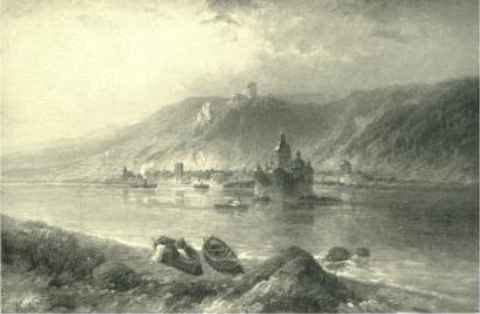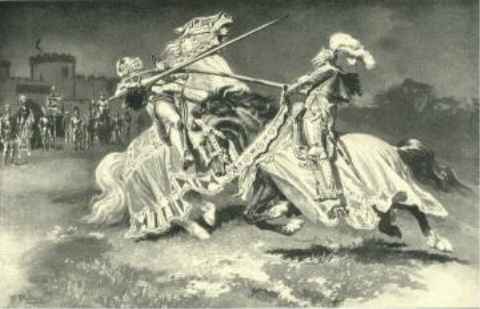Kaub
Castle
Gutenfels

Kaub,
Burg Gutenfels und Pfalz
Nach dem Gemalde von N. v. Astudin
About the middle of the thirteenth century, there
was
a stately castle near Kaub which was inhabited by Count Philip of
Falkenstein.
There he lived very happily with his beautiful sister Guta, who was as
good
as she was fair.
Numerous knights had sought to win her love, but
none
had achieved this conquest, the castle maiden having no desire to
exchange
her brother's hospitable home for any other.
At that time a magnificent tournament was held at Cologne,
to which knights from all countries of the kingdom far and near and
even
from England Were invited.
A great multitude of spectators were assembled to
see
the stately knights contending for the prize, which a fair hand would
bestow
on them.
Among the nobles present at the tournament was a
knight
from England, whose graceful figure and splendid armour were
particularly
striking. He wore a veiled visor, and the stewards of the tournament
announced
him under the name of "the Lion Knight," a golden lion ornamenting his
shield.
Soon the majestic knight's master-like manner of fighting created a
great
sensation, and when he succeeded in unhorsing his opponent, a most
formidable
combatant, loud rejoicings rang through the lists.
Count Philip and his sister were among the guests.
Guta
had been watching the strange knight with ever increasing interest
during
the tournament, regretting at the same time that she could not see his
face.
But an opportunity soon presented itself when the
knight
was declared victor. When she was selected to present the prize, a
golden
laurel-wreath, to the winner, she became much embarrassed, and a
feeling
such as sine had never before experienced seized her as sine looked at
the
Briton's face for the first time.
Perhaps the knight may have read in the lovely
maiden's
countenance what she in vain tried to hide from him, perhaps a spark
from
that passionate fire which had so suddenly fired her heart, may have
flown
into his soul as he knelt before her to receive the wreath, which she
placed
on his head with a trembling hand. Who can tell?
Afterwards when these two were conversing together
in
subdued whispers, the knight silently admiring her grace and the maiden
scarcely
able to restrain her feelings, the thoughts which he longed to tell
her,
flamed in his heart. The same evening in the banqueting hall, when the
music
was sounding within its walls, he was Guta's inseparable companion, and
eloquent
words flowed from his lips telling her of the love which his eyes
betrayed.
The proud stranger begged Guta for Her love and
Swore
to be hers; he told her he must at once return to his country where
urgent
duty called him, but that he would come back to claim her in three
months'
time. Then he would publicly sue for her hand and declare his name,
which
circumstances compelled him to keep secret for the time being.
Love will make any sacrifice; Guta accepted her
lover's
pledge willingly, and thus they parted under the assurance that they
would
soon meet again.
Five months had passed. That terrible time ensued
when
Germany became the battlefield of the party-struggles over the election
of
the emperor. Conrad IV, the last of the house of Hohenstaufen, had died
in
Italy. In the northern countries there was a great rising against
William
of Holland who was struggling for the imperial throne; Alphonso of
Castile
was chosen king in one part of the country, while Richard of Cornwall,
son
of John, king of England, was elected in another; but Richard, having
received
most influential votes, was crowned at Aix-la-Chapelle, and from thence
he
started on a journey through the Rhine provinces, to the favour of
which
he had been chiefly indebted for his election.
Spring was casting her bright beams
over waves
and mountains in the valley of the Rhine, but in Falkenstein castle no
ray
of sunshine penetrated the gloom. Guta, pale and unhappy, sat within
its
walls, weaving dreams which seemed destined never to be fulfilled.
Sometimes
she saw her lover dying on a terrible battle-field with her name on his
lips,
then again laughing and bright with a maiden from that far-off island
in
his arms, talking derisively of his sweetheart on the Rhine. She became
more
and more conscious that she had given him her first love, and that he
had
Cruelly deceived her. Sorrow and grief had taken possession of her, and
all
her brother's efforts to amuse her and to distract her attention were
in
vain.
A great sound of trumpets was heard one day on the highway,
and a troop of knights stopped at the castle. Guta saw the train of
warriors
from her window, where she had been sitting weeping. The count with
chivalrous
hospitality received them, and led them into the banqueting-hall. His
astonishment was great, when he recognised the bold Briton, the victor
at
the tournament in Cologne, as leader of this brilliant retinue, he who
had
broken his secret pledge to his beloved sister. A dark glance took the
place
of the friendly expression on his face. The Briton seemed to notice it
and
pressing Philip's hand said cordially, "I am Richard of Cornwall,
elected
Emperor of Germany, and I have come here to solicit the hand of your
sister
Guta, who promised herself to me five months ago in Cologne. I come
late
to redeem my promise, but my love is unchanged. I beg you to announce
my
arrival to her without betraying my name."
Philip bowed deeply before the illustrious guest,
and
the retainers respectfully retired to a distance. The great guest
strode
up and down the room impatiently. Then the doors were suddenly thrown
open,
and a beautiful figure appeared on the threshold, her face glowing with
emotion.
With a low cry Guta threw herself into her lover's
arms,
and the first moments of their reunion were passed in silent happiness.
Philip now entered the room unperceived, and
revealed
the secret to his sister. The maiden in a great confusion and shame
stole
a look at her lover's eyes, and he, drawing her gently to him, asked
her
to share all
– even his throne with
him.
Shortly afterwards Richard celebrated his marriage
with
imperial magnificence at the castle on the Rhine, which Philip thence
forward
called Gutenfels, in honour of his sister.

Turnier
zu Koln
(zu der Sage von Burg Gutenfels)
Click
 to go to the next
section of
the Legends of the Rhine to go to the next
section of
the Legends of the Rhine
|

